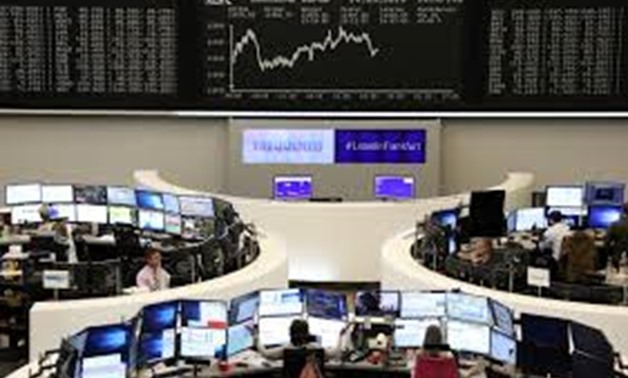
FILE PHOTO: The German share price index DAX graph is pictured at the stock exchange in Frankfurt, Germany, May 14, 2019. REUTERS/Staff
LONDON (Reuters) - A global equity bounce stemming from softer rhetoric by U.S. President Donald Trump on the trade dispute with Beijing waned on Wednesday as grim China data and fresh Italian debt woes cast a shadow over global markets.
Concerns that the world’s top two economies could career into a fierce and protracted trade war has kept markets on edge over the past days. Investors had taken some comfort from Trump calling the trade dispute with Beijing “a little squabble” on Tuesday and insisting talks had not collapsed.
But data from China showing surprisingly weak retail sales and industrial output growth weighed on markets and added pressure on Beijing to roll out more stimulus.
Adding to the woes are fears over Italy’s fiscal situation after Rome said it was ready to break EU fiscal rules to spur employment.
Italian stocks declined 0.7% to lead European stocks lower while France’s benchmark slipped 0.4%. Data confirming that Germany’s economy had returned to growth in the first quarter cushioned the DAX which eased 0.2%. London’s FTSE rose 0.2%.
“Investors had been waiting for data to confirm signs of stabilization in the Chinese economy which, in turn, would bolster expectations that the global economy could start making a sustainable recovery,” said Neil McKinnon at VTB Capital.
“The recent escalation in tariffs makes that more difficult and can only add to investor risk aversion and increase the risk of a more prolonged economic downturn.”
The souring mood also looked to spill over to Wall Street with U.S. futures pointing to a softer open following healthy gains in the previous session. MSCI’s broadest index of world stocks traded flat.
In currency markets, the Australian dollar - a proxy of China-related trades - fell to its lowest level in three months amid the China data fallout.
The dollar held broadly steady at 109.51 yen, having pulled away from a three-month low of 109.020 plumbed on Monday when trade war worries boosted investor demand for the safe-haven Japanese currency.[FRX/]
The Chinese yuan was a shade firmer at 6.9056 per dollar in offshore trade, having edged away from a five-month trough of 6.9200 set on Tuesday. The euro remained anchored at $1.1214 while the dollar index against a basket of six major currencies was nearly flat at 97.524 after gaining 0.2% the previous day.
The pound remained near a two-week low after Prime Minister Theresa May’s spokesman said late on Tuesday she planned to put forward her thrice-rejected Brexit deal in early June to try to secure an agreement on how to extract Britain from the European Union before the summer holiday.
In commodities, U.S. crude futures fell 1 percent to $61.15 per barrel after the American Petroleum Institute (API) reported a bigger-than-expected build in crude inventory. [O/R]
U.S. crude inventories rose by 8.6 million barrels in the week to May 10 to 477.8 million, compared with analysts’ expectations for a decrease of 800,000 barrels.
Brent crude lost 0.6% to trade at $70.38 per barrel.
Brent and U.S. crude futures had surged the previous day after top exporter Saudi Arabia said explosive-laden drones launched by a Yemeni-armed movement aligned to Iran had attacked facilities belonging to state oil company Aramco.

Comments
Leave a Comment